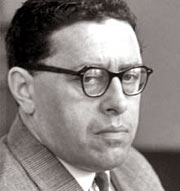Yury Trifonov
Yury Trifonov | |
|---|---|
 | |
| Born | 28 August 1925 Moscow, Soviet Union |
| Died | 28 March 1981 (aged 55) Moscow, Soviet Union |
| Language | Russian |
| Notable works | The House on the Embankment The Impatient Ones The Old Man |
| Signature | |
Yury Valentinovich Trifonov (Russian: Юрий Валентинович Трифонов; 28 August 1925 – 28 March 1981) was a leading representative of the so-called Soviet "Urban Prose". He was considered a close contender for the
Childhood and family
Trifonov was born in the luxurious apartments on the
Trifonov's mother, Evgeniya Abramovna Lurie (1904–1975), an engineer and accountant, was of half Russian and of half Jewish descent.
At school, Trifonov edited class newspapers, composed poetry and wrote short stories. He spent 1941 and 1942 in Tashkent, capital of the Uzbek SSR. During the war, in 1942–45, he worked as a fitter in a factory in Moscow. In 1945, he edited the factory's newspaper.[8]
Career
Trifonov attended the
In 1964–1965, Trifonov published the documentary novel The Campfire Glow, in which he described the revolutionary activities of his father and his uncle Evgeny (the excerpts of whose diaries are included in the narrative) before the revolution and during the civil war.[11] Later, he wrote several stories which were published in the Novy Mir, including Vera and Zoyka (1966) and Mushroom Autumn (1968).[10]
The cycle Muscovite novellas, started in the late 1960s, marked the beginning of the "Urban Prose", portraying the everyday lives of city dwellers.[10][12] The cycle includes the novels The Exchange (1969), Taking Stock (1970), The Long Good-Bye (1971), Another Life (1975), and The House on the Embankment (1976).[13] The last novel describes the lives of the residents of the House on the Embankment in the 1930s, many of whom were killed during the Great Purge of 1937.[14]
In 1973, Trifonov published the historical novel
Trifonov was also known as a sports journalist. He published numerous articles on sports; for almost twenty years, he was a member of the editorial board of the magazine Physical culture and sports.[20]
Personal life
Trifonov was married from 1949 to 1966 to the opera singer Nina Nelina (born Nurenberg), the daughter of the well-known artist Amshey Nurenberg.[21] The marriage was ended by Nelina's death. In 1951, they had a daughter, Olga (Tangyan). Later, he was married to Anna Pavlovna Pastukhova, an editor. In 1975, he married for the third time, to Olga Romanovna Miroshnichenko (b. 1938), a writer formerly married to the writer Georgy Beryozko. Their son Valentin was born in 1979.[22]
After Trifonov's death, Olga Miroshnichenko-Trifonova published her late husband's diaries and notebooks, going back to the writer's schooldays and ending in 1980. She published her memoirs of Trifonov in 2003.[2]
Death
Yury Trifonov died in 1981, aged 55, from a pulmonary embolism after an operation to remove a kidney. He is buried in Moscow's Kuntsevo Cemetery.[23]
Legacy
A memorial plaque dedicated to Trifinov was opened on the House on the Embankment in 2003.[24]
English translations
- Students: A Novel, Foreign Languages Publishing House, 1953.
- The Impatient Ones, Progress Publishers, 1978.
- The Long Goodbye: Three Novellas, Ardis, 1978.
- A Short Stay in the Torture Chamber, from The Wild Beach and Other Stories, Ardis, 1992.
- Disappearance, Northwestern University Press, 1997.
- The Old Man, Northwestern University Press, 1999.
- Another Life and The House on the Embankment (novel), Northwestern University Press, 1999.
- The Exchange and Other Stories, Northwestern University Press, 2002.
Notes
- ^ Cornwell & Christian 1998.
- ^ a b c d Shrayer 2007.
- ^ Partridge 1990.
- ^ a b Far Eastern affairs, Issues 5–6 (Institut Dal’nego Vostoka, Akademimaya nauk SSSR, Progress, 1989)
- ^ Shrayer 2007, p. xlviii.
- ^ a b c "Evgeniya Abramovna Lurie–Trifonova" (in Russian). House on the Embankment museum.
- ^ Gillespie 2006, p. 106.
- ^ a b Gillespie 2006, p. 3.
- ^ In 1974, Trifonov remarked (see Trifonov, Iu. (1974). "V kratkom – beskonechnoe". Voprosy literatury (in Russian). 8: 171–194.): "One can not renounce his books. But one can go away from them. Sometimes very far away."
- ^ JSTOR 40921332.
- ^ Gillespie 2006, p. 6.
- village proseof the 1960s and 1970s.
- JSTOR 307735.
- ^ See Leving, Yuri. "Power and Candy". New Literary Review. 75: 258–290. for a discussion of the intertextuality in The House on the Embankment
- ^ Croft 2006, p. 8.
- ^ See also Böll, Heinrich. "Der Zar und die Anarchisten. Zeit des Zögerns. Jurij Trifonows großer Geschichtsroman aus dem alten Rußland". Die Zeit (in German).
- ^ Gillespie 2006, pp. 9, 140.
- ^ Gillespie 2006, p. 9.
- ^ Gillespie 2006, p. 180.
- ^ Kolesnikov, Andrey. "Cold war on the ice – 4". Chastny Korrespondent.
- ^ Gillespie 2006, p. 4.
- ^ Gillespie 2006, pp. 4, 213.
- ^ "Author Yuri Trifonov". Daytona Beach Morning Journal. 2 April 1981.
- ^ Lavretskaya, A. (1 March 2003). "Yury Trifonov returns to the House on the Embankment". Kommersant.
References
- Cornwell, Neil; Christian, Nicole (1998). Reference guide to Russian literature. Taylor & Francis.
- Croft, Lee B. (2006). Nikolai Ivanovich Kibalchich: terrorist rocket pioneer. Lulu.com. ISBN 9781411623811.
- Gillespie, David (2006). Iurii Trifonov: Unity Through Time. Cambridge University Press. ISBN 9780521025713.
- Partridge, C. J. (1990). Yuri Trifonov's the Moscow cycle: a critical study. E. Mellen Press.
- Shrayer, Maxim D. (2007). An Anthology of Jewish-Russian Literature: Two-Centuries of Dual Identity in Prose And Poetry, Two-Volume Set. M.E. Sharpe.
Further reading
- Kolesnikoff, Nina (1991). Yuri Trifonov: a critical study. Ardis.
- Шитов, Александр Павлович (1997). Юрий Трифонов: хроника жизни и творчества : 1925-1981 (in Russian). Уральский ун-т.
- Tangian, Olga. Испытания Юрия Трифонова (PDF) (in Russian). odessitclub. (Reminiscences of Trifonov's daughter)
